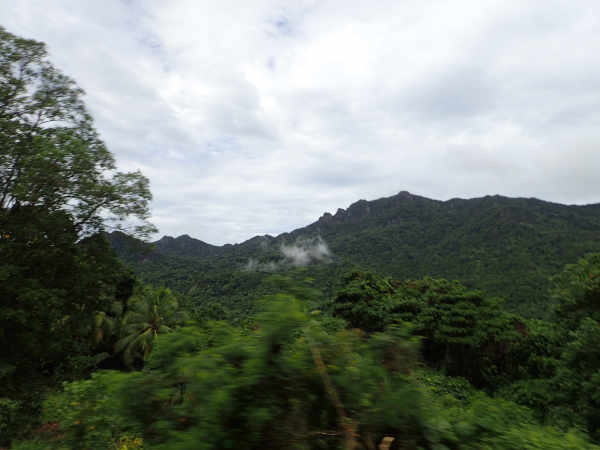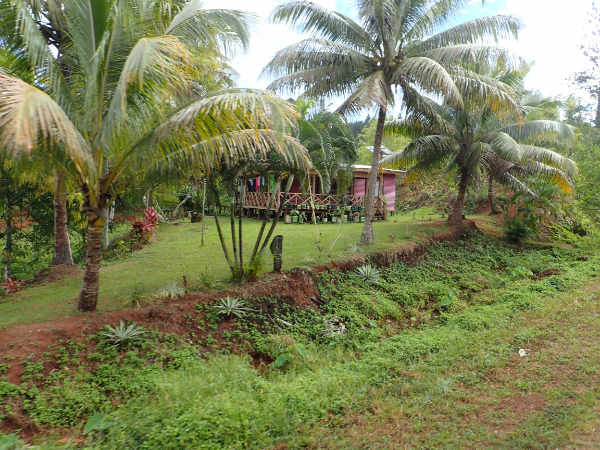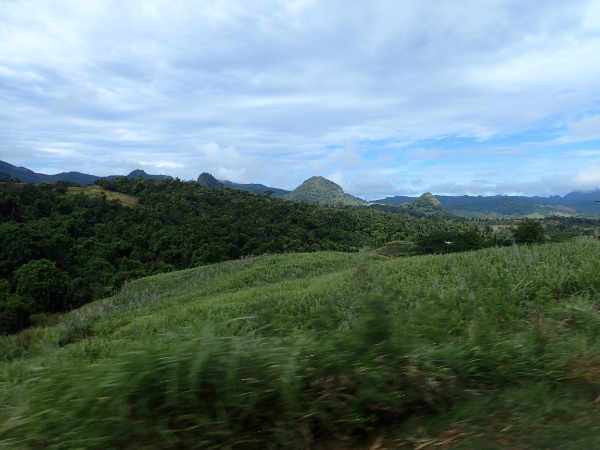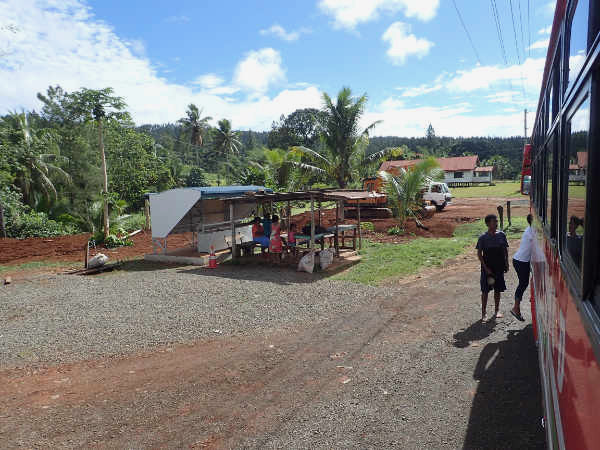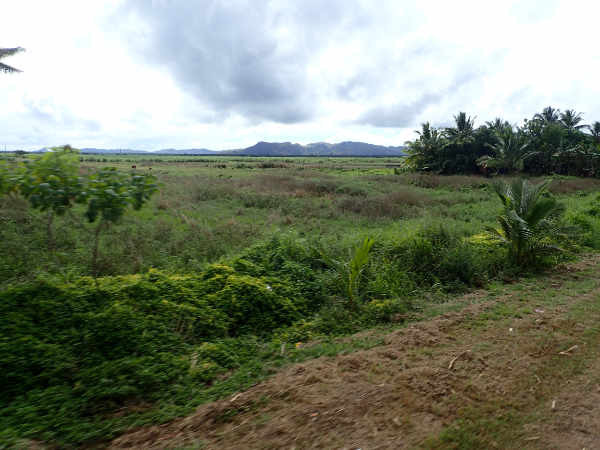The bus journey to Labasa

Labasa (pronounced ‘lambasa’) is the main town on Vanua Levu. Since we’d arrived in Savu Savu, it felt like all we had done was officialdom and electrics (and a bit of swimming for Franco) so we gave ourselves a day off. The fare to Labasa is Fj$6.80 but the public transport system has, officially at least, gone entirely over to e-cards, sold exclusively by Vodafone, and the smallest denomination of pre-paid cards is $20. We found the right kiosk to buy the cards and boarded our bus which was already half full. A man stood in the entrance giving some kind of lecture, frequently punctuated by ‘amen’ and ‘allelulia’. The driver was friendly and helped us negotiate the e-ticket franking machine then as we walked down the aisle, passengers greeted us with smiles and ‘bula’ (hello). We found a seat near the back and joined the audience (we had no choice, he wasn’t going away). His speech seemed fairly erratic to me, he waved his arms a lot and ran out of things to say from time to time but instead of leaving, just started all over again. Every now and then he must have cracked a joke because the other passengers sort of giggled. Franco loathes people who impose their religious views, unsolicited, on others and was grumbling under his breath. I suggested that for all we knew he could have been urging us to join a union or explaining that our driver was a dangerous man. At last he got off and we set off. Most of our companions quickly fell asleep. The road follows the coast to the end of the bay where the copra (coconut oil) factory is, then heads inland through secondary growth jungle. As it climbs the vegetation becomes taller cloud forest. I opened my nostrils and filled my lungs with air, searching for that delicious humus scent associated with damp forest soils but all I could smell was the burning brakes as we screamed down a steep hill.
Cloud forest Once the high point passed, the dense vegetation gives way to plantations of Pinus radiata, a relatively fast growing pine from the west coast of the USA. Lower down, fields of sugar cane stretch into the distance. More people got on the bus, I noted that Fijians are big people, not so much fat, though obesity rates are high, as well built, you wouldn’t want to pick a fight with them. They also seem to have particularly large feet, and those that don’t bother with shoes, have even bigger feet.
A nice looking house typical of the area
Interesting hills on the approaches to Labasa
Bus stands also serve as market produce stalls
Deforested land where sugar plantations have been established In Labasa we got off at the bus station which is next to the market. There were people everywhere. It felt like India but without the hassle factor; young men with wheelbarrows dashing around doing deliveries, shoppers elbowing each other, passengers jumping off buses, others waiting surrounded by piles of boxes and bags, or squabbling for a small piece of shade. The ladies wore colourful clothes, the Indian ‘shalwar kameez’ (a dress worn over leggings or trousers), beautiful saris or the Fijian sulu and jaba (skirt and dress worn together) and anything and everything in between. We felt a little overwhelmed, we hadn’t seen this many people in the same place for years. Franco needed the bathroom so we asked at a food counter. “At the back of the supermarket.” The man said. We waded through supermarket crowds but still couldn’t find a toilet. Franco asked a security guard and he took him to the staff facilities. Later Franco asked where the loo was at the post office and they let him use the post master’s. We couldn’t work out whether there are no public toilets and this is what everyone does or whether these people were just taking pity on the poor ‘palangi’. At the market we found drinking coconuts. These were at the next stage of ripeness from green coconuts and the water was sweeter but still very refreshing. They cost Fj$2 each. It was lunchtime so we looked around for a snack. Most of the traders were Indian and one whole side of the market was dedicated to ladies selling Indian snacks. A bag of 10 cost Fj$2. Two dollars is the magic number, everything from ginger to aubergines at the Savu Savu market comes in $2 bundles. We struck out from the market down Main Street, indeed the only street. It was lined with shops kept by Indians; clothes stores, white goods stores, junk stores, the odd barber and one hotel ‘The North Pole’. We were looking for an ice-cream and had so far failed to find a stand. Franco thought the name was promising so we stepped inside. The air conditioning was welcome and apart from a table of four yachties (as we later found out) everyone else in the restaurant was Fijian. On our way back to the bus station (there wasn’t much to do in Labasa), we stepped into a shop looking for shorts for Franco. Not a single pair was his size. He’d looked for shorts in a New Zealand charity shop but there had been none, Kiwi men wear their shorts until they fall off them. We struck lucky though, in the store next door which had Franco’s size in every shape and colour. We thought the bus was at ten to two, and so did the four yachties who were already waiting but on asking various people, the consensus seemed to be that it would arrive at 14:30. We waited in the shade. An Indian lady with her grand child asked me if we would be around for a while. I said yes. “Can you look after him please? I’m just going over there.” She said pointing at the market. “Of course.” I replied. Franco was horrified, “what if she doesn’t come back in time?” “It’ll be fine, just pray she doesn’t get run over!” The kid was a little put out. I think he felt he could look after himself. There was no need to worry, the woman returned a while later. Franco went to check the destination of a bus over on the other side and I promised I wouldn’t move. Just after he had gone, our bus arrived, but not where we had been told to wait. With horror I watched a tidal wave of people swell towards it, there was a real risk we wouldn’t get on and the next and last bus was a 4pm. Instinctively my Bangladesh-learnt ‘queuing’ skills kicked in, I know how to rugby tackle my way onto public transport. Luckily Franco was back and saw me in the melee. Next to me was a sweet little girl who was grinning from ear to ear, I got her onto the bus. Then to my left a mum with three kids, she got on but only two of the children made it before the driver put his foot on the accelerator and drove forwards to the end of the bay, with people still dangling out the door. The mother shrieked. I picked up her kid while Franco guarded the rear, and soon all three of us were on. The boy must have told his mum what had happened because she was very grateful. At the back we squeezed onto a bench next to a lady holding a large box on her knees. She explained she was going to her great niece’s first birthday party and that the box contained the birthday cake she’d made. She pointed at the girl in the seat in front of us who repeatedly pushed a rucksack at the boy next to her. “She’s not right in the head.” She explained, giggling. A moment later the girl’s mum and sister arrived and the girl assaulted her sister, slapping her hard on the head. The sister calmly sat down. Over the next two hours I had time to feel sorry for the little girl, she seemed well and truly trapped in her head and her interaction with the world was mostly violent. I admired her brother and sister who always treated her kindly despite her abuse. Our bus had no windows and we welcomed the cooler air as we crossed over the island’s ridge. As we started the descent towards Savu Savu it started to rain, luckily it didn’t last long. A few miles out of town, the driver pulled into the company’s depot and refuelled with the engine running. As we stepped down, back in Savu Savu, we breathed a sigh of relief. We’d survived the Labasa bus journey.
Recovering off a desert island |
